人教版八年级英语上册全部课件.ppt
合集下载
人教版八年级上册英语全册课件-八上英语课件

do anything
✔
Julie interesting?
study for tests? ✔
go out with anyone?
✔
Talk about your vacation plans with your friends and fill in the chart.
Name Vacation plans Who? When?
Where did you go on vacation?I went to
the
2mountai 1 ns.
4
53
1. Tina 2. Xiang Hua
3. Sally
4. Bob
5. Tom
1c
A: What did Tina go on vacation? B: She went to the mountains.
stayed at home
Where did you go on vacation?
went to New York City
Where did you go on vacation?
went to the beach
Where did you go on vacation?
visited my uncle
People
Places
Grace New York City (Central Park) Kevin the beach Julie stayed at home
2b Listen again. Check (✔) Yes, I did or No, I didn’t for each question.
anyone 任何人 each 每个
人教版八年级英语上册-全册PPT课件全集(149张)

26) more than 多于
课文要点
1、What do you usually do on weekends?
on weekens 表示“在周末”,泛指每个周末; on the weekend表示“在周末,在这个周 末”,特指某个周末。
2、help with housework
help sb. with sth. = help sb. (to) do sth
初二英语上册
Unit 1: Where did you go on vacation?
New Words.
anyone wonderful something seem someone try different umbrella hungry dislike anywhere most everyone bored dicide wonder wait enough
修饰不可数名词,意为 “太多”,还可修饰动词 做状语
修饰形容词或副词,意为 “太”
She bought too many eggs. We have too much work to do.
You are walking much too fast.
too much, much too,用法区别看后头,much后接不可数, too后修饰形或副。Too many 要记住,后面名词必复数。
1)单数名词词尾加’s, 复数名词词尾没有s, 也要加 ’s the girl’s pen Children’s Day
2)复数名词以s结尾的只加 ’ the students’ reading room
3)如果两个名词并列,并且分别有 ’s, 则表示“分别有”; 只 有一个名词有一个’s, 则表示“共有”;
人教版八年级英语上册课件:Unit 2(共29张PPT)
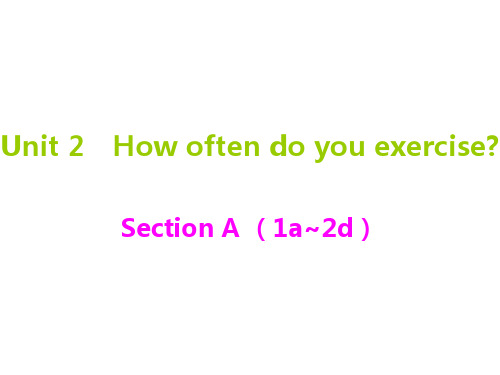
B
要点梳理
( )2. We need a good night’s sleep because we have got a _____ day tomorrow. A. empty B. hungry C. full D. free ( )3. Don’t _____ the bowl with water because it will spill(溢出). A. fill B. full C. filled D. fills
要点梳理
【应用】 ( )1. Sun Yang _____ every day and he swims very well. A. exercise B. exercises C. do exercise D. does exercises
要点梳理
B
( )2. Tom does eye _____ in the classroom after doing math _____ for half an hour. A. exercises; exercises B. exercise; exercise C. exercises; exercise D. exercise; exercises
【举例】He can hardly speak English. 他几乎不会说英语。 They hardly ever spoke another word. 他们几乎没有再说一句话。 He can hardly understand it, can he? 他几乎不懂,是吗?
要点梳理
课前导学
three times a week
use the Internet
swing dance
have to
你周末通常做什么?
要点梳理
( )2. We need a good night’s sleep because we have got a _____ day tomorrow. A. empty B. hungry C. full D. free ( )3. Don’t _____ the bowl with water because it will spill(溢出). A. fill B. full C. filled D. fills
要点梳理
【应用】 ( )1. Sun Yang _____ every day and he swims very well. A. exercise B. exercises C. do exercise D. does exercises
要点梳理
B
( )2. Tom does eye _____ in the classroom after doing math _____ for half an hour. A. exercises; exercises B. exercise; exercise C. exercises; exercise D. exercise; exercises
【举例】He can hardly speak English. 他几乎不会说英语。 They hardly ever spoke another word. 他们几乎没有再说一句话。 He can hardly understand it, can he? 他几乎不懂,是吗?
要点梳理
课前导学
three times a week
use the Internet
swing dance
have to
你周末通常做什么?
人教版八年级英语上册课件:Unit 4(共32张PPT)
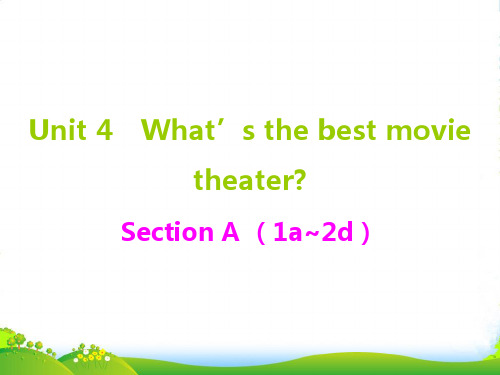
要点梳理
3. You haven’t answered my ____q_u_e_s_ti_o_n____. 4. This ___p_r_o_b_l_e_m___ on the environmental protection floored each of us.
要点梳理
常用句型精讲 “How do you like …”句型的用法 【教材例句】How do you like it so far? 到目前为止 你觉得怎么样?(教材第26页) 【用法】How do you like …?=What do you think of …?意为“你觉得……怎么样?”。这个句型是用 来询问某人对某事的观点、看法。在使用时要注意各自 不同的搭配形式。
课前导学
8. _c_h_e_a_p_l_y__ adv. 便宜地;低廉地 9. ___s_o_n_g___ n. 歌;歌曲 10. ____c_h_o_o_s_e___ v. 选择;挑选 11. ___c_a_r_e_fu_l_ly___ adv. 细致地;小心地;谨慎地 12. ___r_e_p_o_r_t_e_r __ n. 记者 13. ____f_r_e_s_h____ adj. 新鲜的;清新的
要点梳理
【举例】It’s boring to listen to the same story. 听相
同的故事是令人厌烦的。
The boring film makes me fall asleep. 这部无聊
的电影让我几乎睡着。
【拓展】 boring和bored的区别
boring boring意为 用来修 “烦人的;无 饰物 聊的”
bored 意为“无聊的; 用来修
郁闷的”
饰人
人教版八年级上册英语Unit1 Where did you go on vacation课件(35张ppt)

•Language structures:
Where did you go on vacation? I went to New York City. Did you go out with anyone? No. No one was here. Everyone was on vacation. Did you buy anything special? No, I bought nothing. How was the food? Everything tasted really good!
Linda: Did you go shopping?
Alice: Of course! I bought ______ for my parents, but _______ for myself.
Linda: Why didn’t you buy _______ for yourself?
Alice: I didn’t really see _______ I like.
Pairworks:
1. How was your vacation?
It was pretty good.
2. What did ...?
I went ...
3. How was ....?
It was fantastic.
4. How were ...?
They were friendly.
在这里可以让学生用他们所会的词语回答.
They
My parents.
Task 1 Talk about your vacation activities.
went to the mountain went to the summer camp
人教版八年级上册英语全册完整ppt课件

stayed at home
Where did you go on vacation?
went to New York City
Where did you go on vacation?
went to the beach
Where did you go on vacation?
visited my uncle
I decided to go to … David went there last summer vacation. The weather there was … The food … I think it was … So I want to go there next vacation.
2c Role-play conversations between Grace, Kevin and Julie.
Where did you go on vacation?I went to
the
2mountai 1 ns.
4
53
1. Tina 2. Xiang Hua
3. Sally
4. Bob
5. Tom
1c
A: What did Tina go on vacaቤተ መጻሕፍቲ ባይዱion? B: She went to the mountains.
Did you …
go with anyone? Grace go to Central Park? buy anything special?
Yes, I did.
✔
✔
✔
No, I didn’t.
play volleyball?
✔
Kevin swim?
✔
Where did you go on vacation?
went to New York City
Where did you go on vacation?
went to the beach
Where did you go on vacation?
visited my uncle
I decided to go to … David went there last summer vacation. The weather there was … The food … I think it was … So I want to go there next vacation.
2c Role-play conversations between Grace, Kevin and Julie.
Where did you go on vacation?I went to
the
2mountai 1 ns.
4
53
1. Tina 2. Xiang Hua
3. Sally
4. Bob
5. Tom
1c
A: What did Tina go on vacaቤተ መጻሕፍቲ ባይዱion? B: She went to the mountains.
Did you …
go with anyone? Grace go to Central Park? buy anything special?
Yes, I did.
✔
✔
✔
No, I didn’t.
play volleyball?
✔
Kevin swim?
✔
人教版八年级英语上册课件:Unit 8(共32张PPT)

要点梳理
4 add的用法 【教材例句】Then, add the cabbage, tomatoes and onion and cook for another 10 minutes. 然后加入 卷心菜、西红柿和洋葱,再煮上10分钟。(教材第58页) 【要点思维导图】
要点梳理
【举例】The fire is going out. Will you add some wood? 火要灭了。请你加点柴,好吗?
要点梳理
( B )3. Would you please _____ your MP3 a
little? Your baby sister is sleeping.
A. turn up
B. turn down
C. turn on
D. turn in
2 cut up的用法
【教材例句】Cut up the bananas. 把香蕉切碎。(教
Please add some salt to the food. 请在食物中 加点盐。
The flowers add to the beauty of the city. 这些 花增添了这座城市的美。
The numbers add up to 100. 这些数目合计为 100。
要点梳理
【应用】
( A )1. _____ some water _____ the soup.
that?
—I tried many ways over and over again. _____, I
made it.
A. Next
B. Then
C. Finally
D. Suddenly
要点梳理
( D )2. Don’t forget _____ thanks when other people help you. A. said B. saying C. say D. to say
人教版英语八年级上册完整课件
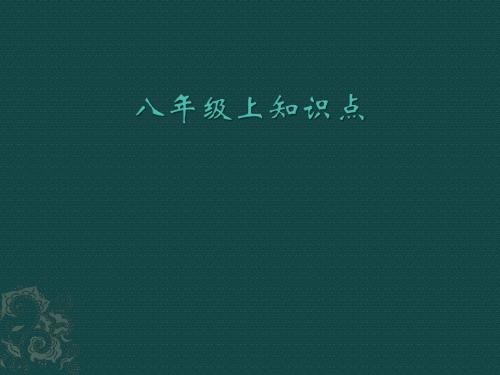
another + 基数词 + 名词 又;再;另…… 基数词 + more + 名词 another 10 minutes 10 more minutes give thanks for sth give thanks to sb 一段时间+ ago …以前 by + doing sth it is time for sb to do sth 到某人做某事的时间了 First / next/ then/ after that/ finally
grow up be sure about 确信;对…有把握 make sure 确保;查明 the meaning of different kinds of in common at the beginning of write down have to do with 关于;与…有关系
take up (尤指为消遣) 学着做;开始做 a weekly plan make the soccer team 成为足球队的一员 make a soccer team 组建一支足球队 make promises to sb 许下诺言 keep/break a promise 遵守/违背诺言
let sb do sth plan to do sth hope to do sth happen to do sth expect to do sth be ready to do sth learn to do sth
be going to 的用法 已经决定或安排要做的事;(客观迹象表明) 可能要发生的事;自然现象 常与表示将来的时间状语或者when引导的时间 状语从句连用 be not/going to + 动词原形 be 动词随主语的人称和数的变化而变化 如果计划去某地,be going to +地点 I am going to Beijing.
人教版初二英语上册 ppt课件
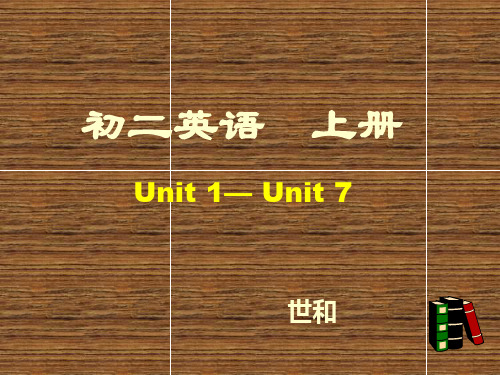
(3? -Of course.
A: _E_x_c_u_s_e__ _m__e_____M! _ay_____I__ ________ borrow your ruler?
B: C_e_r_t_a_in_l_y_!T_a_k_e_____ this one. A: Thank you. Oh, this one is short. Do you __h_a_v_e___ a long
___o_n_e___? B: _S_o_r_r_y___, I don’t.
A: _E_x_cu_s_e___ _m__e_____! Dohyaovue _______ru_learlong ________? C: Yes. A: __M__a_y___ I borrowit________? C: Certainly! Here ___y_o_u___ _a_re______.
Unit 2 How do you come to school?
一般现在时:表示动作的习惯性 或 经常性。
I go to school every day. We sometimes play basketball after class.
特别要注意,在英语的一般现在时的使用中,如果 主语是第三人称单数,谓语动词也要相应地采用第 三人称单数的形式。
paper 纸;纸张 为不可数名词,通常不用“a”或 “an” 这样
的不定冠词来修饰。
Paper is very useful(有用的). The paper here is not clean.
a piece of paper two piece of paper three glasses of water seven bottles of orange
A: _E_x_c_u_s_e__ _m__e_____M! _ay_____I__ ________ borrow your ruler?
B: C_e_r_t_a_in_l_y_!T_a_k_e_____ this one. A: Thank you. Oh, this one is short. Do you __h_a_v_e___ a long
___o_n_e___? B: _S_o_r_r_y___, I don’t.
A: _E_x_cu_s_e___ _m__e_____! Dohyaovue _______ru_learlong ________? C: Yes. A: __M__a_y___ I borrowit________? C: Certainly! Here ___y_o_u___ _a_re______.
Unit 2 How do you come to school?
一般现在时:表示动作的习惯性 或 经常性。
I go to school every day. We sometimes play basketball after class.
特别要注意,在英语的一般现在时的使用中,如果 主语是第三人称单数,谓语动词也要相应地采用第 三人称单数的形式。
paper 纸;纸张 为不可数名词,通常不用“a”或 “an” 这样
的不定冠词来修饰。
Paper is very useful(有用的). The paper here is not clean.
a piece of paper two piece of paper three glasses of water seven bottles of orange
部编人教版八年级英语上册《【全册】第1至5单元》精品PPT优质课件

He went to New York City.
Where did he go on vacation?
He went to the beach.
Language points
1. — Where did you go on vacation? — I went to the mountains.
Xiang Hua: _I_w__en__t _to__N_e_w__Y_o_r_k__C_i_t_y_.
Conversation 2
Girl: What did you do on vacation, Sally? Sally: Nothing. I just _s_t_a_y_e_d_a_t__h_o_m_e__. Girl: And did you do anything interesting, Bob? Bob: Yes. I _v_i_si_t_ed__m__y_u_n_c_l_e_. We went fishing,
Xiang Hua: Hey, Tina. Where did you _g_o_o_n__v_a_c_a_ti_o_n_? Tina: I _w_e_n_t__to__th__e_m__o_u_n_ta_i_n_s_ with my family.
Xiang Hua: Did everyone have a good time? Tina: Oh, yes. Everything was excellent. Where did you go, Xiang Hua?
拜访我的叔叔 照相 上个月 黄果树瀑布 去度假
Lead-in
What did you do on summer vacation?
visited museums
人教版八年级上册英语Unit-1-5-全部词汇详解课件(137页)全文

◆ Someone is waiting for you at the door. ◆ What delicious chicken! I can’t wait to
taste it.
prep. & adv. 在……下面; 到……下面
反义词: above,意为“超过;在……上面”。 例句: ◆ From the top of the building, I could
短语:twice a week 一周两次 think twice 再三考虑
例句: ◆ I go to the movies twice a week. ◆ The ruler is twice as long as that one.
拓展: “一次”用once,“两次”用twice, “三次及以上”用“基数词+times” 如:twice a day, four times a year
dislikes.
Unit 2 How often do you exercise?
Section A
n.家务劳动; 家务事
构成: house(n. 房子)+ work( n. 工作) 短语:do (the) housework 做家务 例句:
◆ He is too lazy so he hardly does housework.
拓展:enjoyable 的相关词 enjoy: v. 享受;喜爱 enjoyment: activities 例句: The park is a popular place
for relaxing activities.
v. 决定;选定
句型: decide (not) to do sth. 决定(不)做某事 decide+“疑问词+动词不定式” decide+宾语从句 decide on sth. 就某事做决定;选定某事 例句:
taste it.
prep. & adv. 在……下面; 到……下面
反义词: above,意为“超过;在……上面”。 例句: ◆ From the top of the building, I could
短语:twice a week 一周两次 think twice 再三考虑
例句: ◆ I go to the movies twice a week. ◆ The ruler is twice as long as that one.
拓展: “一次”用once,“两次”用twice, “三次及以上”用“基数词+times” 如:twice a day, four times a year
dislikes.
Unit 2 How often do you exercise?
Section A
n.家务劳动; 家务事
构成: house(n. 房子)+ work( n. 工作) 短语:do (the) housework 做家务 例句:
◆ He is too lazy so he hardly does housework.
拓展:enjoyable 的相关词 enjoy: v. 享受;喜爱 enjoyment: activities 例句: The park is a popular place
for relaxing activities.
v. 决定;选定
句型: decide (not) to do sth. 决定(不)做某事 decide+“疑问词+动词不定式” decide+宾语从句 decide on sth. 就某事做决定;选定某事 例句:
人教版八年级英语上册课件:Unit 3(共38张PPT)
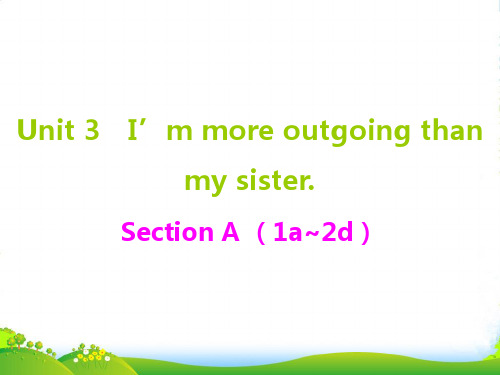
They _____ playing volleyball.
A. both are; both like
B. are both; like both
C. are both; both like
D. both are; like both
要点梳理
3 win的用法;though的用法 【教材例句】You can tell that Lisa really wanted to win, though. 不过,你能感觉到丽莎是真的想赢得比 赛。(教材第18页) 【用法1】win用作动词,意为“赢;获胜;得到成 功”。在用作及物动词时,它的宾语往往是奖品、奖学 金、名誉、财产、战争或运动等。win的过去式和过去 分词均为won。
要点梳理
【举例】Please hold both my hands in yours. 请握 住我的双手。(both用作形容词)
We both have too much work to do. 我们俩有 太多的工作要做。(both用作代词)
We have both passed the mid-examination. 我 们俩都通过了期中考试。(both 用作副词) 【辨析】both指“两者都”, all指“三者或三者以上都” 。如:
要点梳理
易混词 (组) 辨析 loudly, loud与aloud的区别 【教材例句】Tina is taller than Tara. And she also sings more loudly than Tara. 蒂娜比塔拉高,而且她 唱歌也比塔拉声音大。(教材第17页)
要点梳理 【要点思维导图】
Although he is more outgoing than you, you are smarter than him. 尽管他比你外向,可你比他聪 明。
人教版八年级英语上册ppt课件
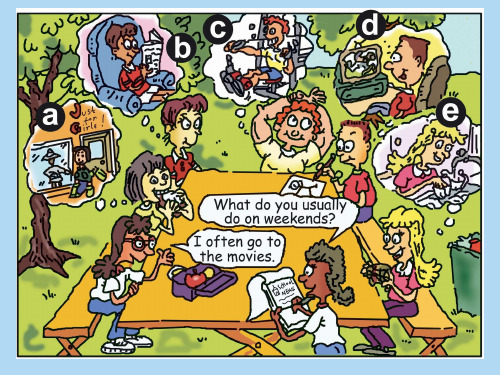
经营者提供商品或者服务有欺诈行为 的,应 当按照 消费者 的要求 增加赔 偿其受 到的损 失,增 加赔偿 的金额 为消费 者购买 商品的 价款或 接受服 务的费 用
经营者提供商品或者服务有欺诈行为 的,应 当按照 消费者 的要求 增加赔 偿其受 到的损 失,增 加赔偿 的金额 为消费 者购买 商品的 价款或 接受服 务的费 用
3b Use the words given to write questions. Then ask
and answer them with a partner.
经营者提供商品或者服务有欺诈行为 的,应 当按照 消费者 的要求 增加赔 偿其受 到的损 失,增 加赔偿 的金额 为消费 者购买 商品的 价款或 接受服 务的费 用
chart and then make conversations.
经营者提供商品或者服务有欺诈行为 的,应 当按照 消费者 的要求 增加赔 偿其受 到的损 失,增 加赔偿 的金额 为消费 者购买 商品的 价款或 接受服 务的费 用
2d Role-play the conversation.
Jack: Hi, Claire, are you free next week? Claire: Hmm ... next week is quite full for me, Jack. Jack: Really? How come? Claire: I have dance and piano lessons. Jack: What kind of dance are you learning? Claire: Oh, swing dance. It’s fun! I have class once a week,
l.
Wow!
- 1、下载文档前请自行甄别文档内容的完整性,平台不提供额外的编辑、内容补充、找答案等附加服务。
- 2、"仅部分预览"的文档,不可在线预览部分如存在完整性等问题,可反馈申请退款(可完整预览的文档不适用该条件!)。
- 3、如文档侵犯您的权益,请联系客服反馈,我们会尽快为您处理(人工客服工作时间:9:00-18:30)。
本课件详细展示了人教版八年级英语上册的全部内容。首先,以Unit 1为例,介绍了主题“Where did you go on vacation?”以及相关的新单词和重要短语。接着,深入讲解了复合不定代词的用法,包括指定对象、数的概念以及定语的后置规则。此外,还探讨了名词所有格的不同形式,并举例说明了enough作为形容词和副词的用法,同时提供了相关的短语和句型。最后,通过对比分析,帮助学生理解并 a little等词汇词组的用法。本课件内容丰富,结构清晰,旨在帮助学生系统掌握八年级英语上册的重点知识。
